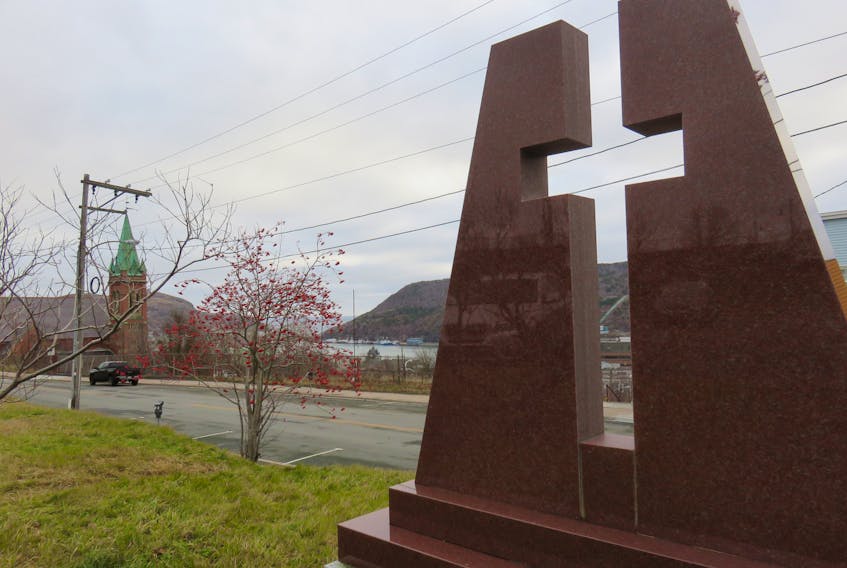For many people in St. John’s, Christmas 75 years ago must have been an uncharacteristically bleak season. The Second World War was in its 39th month. Each day, the newspapers spread banner headlines in black ink across their pages.
On the evening of the 12th day of December a fire at the new Knights of Columbus hostel on Harvey Road took 99 lives. It was fast and fierce. A festive season event within minutes turned into a melee of death and destruction and it received inadvertent broadcast through the open microphones of Uncle Tom’s Barn Dance Troupe assembled on stage.
On the days immediately following, group funerals crawled wearily through town toward mass graves. Reports and rumours of the tragedy mixed with mid-December newspaper advertising urging shoppers to stock up on spices, candies, chocolates and more.
And on the same night of the fire, our Commissioner for Public Health and Welfare, John C. Puddester, had taken to the air to try and get Newfoundlanders to cut down on our consumption of tea. The channels of transportation were falling increasingly under enemy fire.
In part, Puddester said, “today, our principal shortage is tea. The cutting off by Japan of some sources of supply and the ruthless submarine campaign of the Hun have combined to make it difficult for us to obtain adequate supplies. Especially is this so from far-off Ceylon where ninety percent of our supplies come from.”
As the war-time rationing, it seems strange that official attention should fall upon one simple commodity. It seems so, because we have changed immeasurably. Tea is not, strictly, a food. It is not essential; meats, vegetables are. Puddester put us all on the honour system “from tonight”. Likely it had more to do with Great Britain for which tea was rather like oil. People there could not function without it and our “normal” tea-drinking would essentially make less available to them.
All told, it could not have been our best Christmas season. Flipping through pages of our newspapers’ big black-and-white photographs now, you can see we were a sombre town. December 1942 was but two weeks old and snow clung to the fringes of the burned heap that was a communal building and snow clung to the edges of open graves.
The full script of John Puddester’s radio address was published the day after he had delivered it on radio. And a day further on, The Evening Telegram commented that the Commission of Government was reversing its stance of the year prior when Newfoundlanders were urged to stock up. Now we were on the honour system to restrain ourselves.
“Luxuries in foodstuffs must be done without,” Puddester intoned. And then he made what to a reader today must surely be a very surprising statement: “The shelves in some stores in the interior of the country (central Newfoundland) are jammed with canned luxuries. It was a great surprise on a recent visit to Buchans and Grand Falls to find enormous quantities of these luxuries in stock. We must make decision as to what we can give up.”
At this point it crossed my mind that if luxury foods were still being manufactured and still being shipped here, then why should people not buy them? Why would their manufacture not have been stopped and the processors’ factories turned to basic foods? Weren’t automobile plants turned to the production of war vehicles? For the answers, I would need to study-up on wartime rationing. And by the way, the fact that luxury foods were readily available in central Newfoundland and Commissioner Puddester saw them there, wouldn’t necessarily mean that this was the only part of Newfoundland where they were to be found.
Christmas prevailed
The Spirit of Christmas Present showed itself still in good form. At first it may look as though we were callous, given the number of tearful families clustered in undecorated homes. But there is something to be said here for resilience and its value.
Seeming to defy Puddester’s caution about foods and shipping, on December 15th The Davis Grocery at No. 166 Merrymeeting Road took out a fair-sized classified ad in the newspapers to announce the following: “Fruit syrup (all flavours); flavouring extracts (all kinds), mixed peel, tutti fruiti, glace cherries, walnuts, spices, cake and pastry flour, boxed chocolates, mixed candy, five-point delicious apples, barrel apples.”
There were good things coming in from all sides. Wholesaler Gerald S. Doyle had all kinds of Cocomalt to deliver to retailers; Bowring’s Grocery Department had cigars, cigarettes, fine tobaccos, cranberry sauce, crabapple jelly, black currant jelly, and, in tins, strawberries, cherries, raspberries, plums, pineapple, pears and fruit salad.
There were ads for Emu Australian Port and Hiram Walker’s London Dry Gin. E.J. Godden Ltd. wholesaled Brazil nuts, sultana raisins, Quaker Malted Cornflakes and Quaker Puffed Rice Sparkies.
I grinned to myself when I spotted an advertisement for Canadian Club Whisky boosted as “Essential for cocktails, ideal for long drinks” in very close proximity to an ad placed by Mews & Dunne Ltd. for Bromo-Seltzer, “for that morning-after feeling.”
Another large ad for Geo. Neal Ltd. (wholesalers) was brief and to-the-point: “Now ready for delivery, Beet Pulp.” This, I learned, was the fibrous residue from the extraction of sugar from the sugar beet. The pulp was shaped (pelleted) and fed to horses, supplementing their hay. Pellets of beet pulp must have been good for reindeer, too.
All this and good war news too: Rommel was on the run; the Italians could no longer form a navy and Britain was sinking goodly numbers of Axis ships. We had 29 more months of hostilities to go.
Paul Sparkes is a longtime journalist intrigued by the history of Newfoundland and Labrador. E-mail: [email protected].









